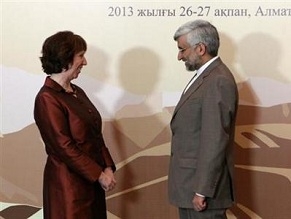|
World Jewish News

Eu foreign policy chief Catherine Ashton with the Iranian nuclear negotiator Saeed Jalili.
|
New round of talks in Kazakhstan on Iran’s nuclear program
26.02.2013, Israel and the World Six world powers known as P5+1 began talks Tuesday with Iran over its nuclear program for the first time in nearly eight months.
The talks take place in Almaty, Kazakhstan.
Iran has held several rounds of negotiations with the P5 plus 1, which comprises Germany and the five permanent members of the United Nations Security Council. The five members are the United States, France, Britain, Russia and China.
But since the delegation last met in Moscow, Iran's uranium enrichment program has expanded in violation of the United Nations Security Council resolutions.
In remarks before the start of the talks, EU foreign policy chief Catherine Ashton, who conducts contacts with Iran on behalf of the P5+1 said : "We are holding these talks with a view to making progress towards allaying the concerns of the international community on the nature of the Iranian nuclear programme, and this round is no exception. We have come here with a revised offer and we have come to engage with Iran in a meaningful way, our purpose being to make sure that we’ve had a good and de tailed conversation, with the ambition that we see progress by the end of the meeting."
Since the last round of negotiations, the United States, the European Union and the U.N. Security Council have continued to pile sanctions against Tehran, crippling the country's economy. Iran's oil exports have plummeted more than 50% as has the value of the rial, Iran's currency.
Most recently, the United States and the European Union imposed sanctions restricting the sale of gold and precious metal to Iran.
A quarterly report published earlier this month by the Vienna-based International Atomic Energy Agency (IAEA) continued to cast doubt on Iran's nuclear program.
The IAEA said Iran had continued its production of 20% enriched uranium, though the majority of the uranium had been converted to fuel, which is not material that can be used for a weapon.
Iran installed new centrifuges, the IAEA reported. It has also refused to provide IAEA inspectors access to the Parchin military complex, which is suspected of housing a large containment vessel that could be
"The Agency is unable to provide credible assurance about the absence of undeclared nuclear material and activities in Iran, and therefore to conclude that all nuclear material in Iran is in peaceful activities," the IAEA concluded.
Ashton’s spokesman, Michael Mann, said world powers do not expect a breakthrough agreement at the Almaty talks.
"It is clear that nobody expects to come from Almaty with a fully-done deal," he said.
US State Department spokeman Patrick Ventrell said "we hope that the Iranian regime will make the strategic decision to come to the talks prepared to discuss substance so that there can be progress in addressing the international community’s concerns. You heard Secretary Kerry talk about this this morning, and we do have a serious updated proposal, and our proposal does include reciprocal measures that encourage Iran to make concrete steps to begin addressing the international community’s concerns."
Talks are expected to run through Wednesday.
by: Maud Swinnen
EJP
|
|
